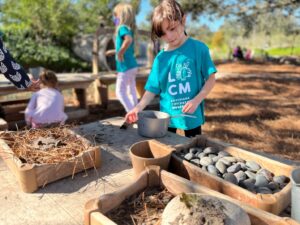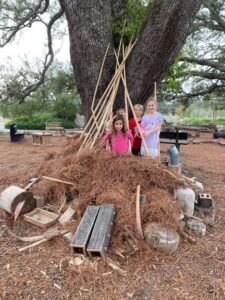Taking Play into the Great Outdoors
March 16, 2023
By Maria Comiskey, Sustainability Director
During LCM’s Kindness Camp in 2021, I met a group of campers outside in the Toddler Landscape for a Thanksgiving meal. The menu had many of the items you would expect at an American holiday table, like turkey, stuffing, and pie, as well as few unconventional dishes, like spaghetti-topped pizza. The campers had no trouble preparing the meals in LCM’s rustic outdoor kitchen, and all the ingredients were locally sourced. Of course, passersby might have mistaken the feast for a table full of rocks, leaves, pine needles, flowers, and mud. But the tablescape imagined by the campers was worthy of a spread in any fancy culinary magazine.
At LCM, we often speak of the child’s 100 languages. In the words of Loris Malaguzzi, co-founder of the Reggio Emilia approach to early childhood learning, children have “a hundred worlds / to discover / a hundred worlds / to invent / a hundred worlds / to dream.” Young children are innately curious and use play to make sense of the world around them. In Reggio classrooms, aesthetics and materials inspire the learning process and natural objects are favored. When kids use natural objects for play or take self-directed play outside, educators describe it as nature play.
Nature play differs from games or sports because it has no predetermined objective. That is not to say that nature play doesn’t have goals or rules; instead, the method and object of play are determined by the children doing the playing. Through open-ended play, children learn to cooperate, negotiate, and resolve conflict. They also exercise creative expression by imagining rocks, sticks, and leaves to be bugs, wands, and magical ingredients.
Numerous recent studies show the ways time spent outdoors can improve health, wellness, social-emotional development, and academic performance. Educators also know that real barriers exist to spending time in nature. Time, safety concerns, weather, and feelings of belonging can contribute to avoiding outdoor play. We understand overcoming such barriers can be daunting.

Not sure where to start? Even a few minutes spent playing in the yard or walking around the block can help kids and caregivers feel more at ease in nature. Try identifying common shapes, colors, or patterns in the things you see. Count trees, birds, or rocks. Describe the sounds you hear. When you visit LCM, spend some time in the Toddler Landscape building a shelter, cooking in the mud kitchen, or digging in the sand box. Use the natural items you find around you as stand ins for toys. Take a walk through our Sensory Garden and play “Eye Spy” with resident wildlife. Follow your child’s lead and encourage their curiosity by asking open-ended questions. As your confidence grows, nature will become more familiar and less daunting. You may notice your child using critical thinking skills to assess risks or understand scientific processes all around them.

